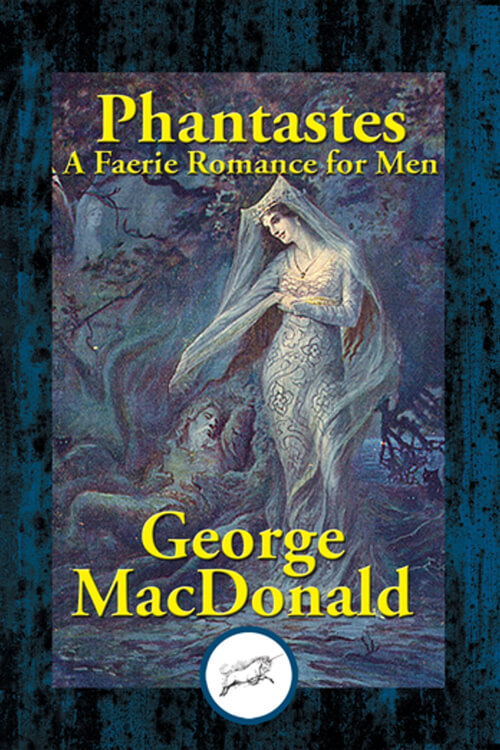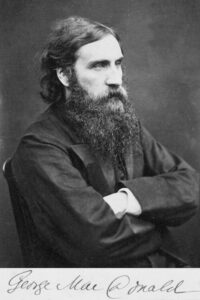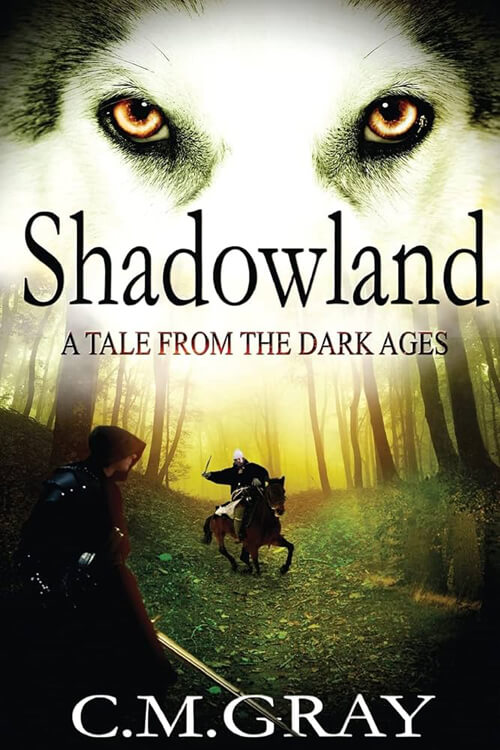
Phantastes, A Faerie Romance for Men and Women
I awoke one morning with the usual perplexity of mind which accompanies the return of consciousness. As I lay and looked through the eastern window of my room, a faint streak of peach colour, dividing a cloud that just rose above the low swell of the horizon, announced the approach of the sun. As my thoughts, which a deep and dreamless sleep had dissolved, began again to assume crystalline forms, the strange events of the foregoing night presented themselves anew to my wondering consciousness. The day before had been my one-and-twentieth birthday. Among other ceremonies investing me with my legal rights, the keys of an old secretary, in which my father had kept his private papers, had been delivered up to me. As soon as I was left alone, I ordered lights in the chamber where the secretary stood, the first lights that had been there for many a year; for, since my father’s death, the room had been left undisturbed. But, as if the darkness had been too long an inmate to be easily expelled, and had dyed with blackness the walls to which, bat-like, it had clung, these tapers served but ill to light up the gloomy hangings, and seemed to throw yet darker shadows into the hollows of the deep-wrought cornice. All the further portions of the room lay shrouded in a mystery whose deepest folds were gathered around the dark oak cabinet which I now approached with a strange mingling of reverence and curiosity. Perhaps, like a geologist, I was about to turn up to the light some of the buried strata of the human world, with its fossil remains charred by passion and petrified by tears.
Perhaps I was to learn how my father, whose personal history was unknown to me, had woven his web of story; how he had found the world, and how the world had left him. Perhaps I was to find only the records of lands and money, how gotten and how secured; coming down from strange men, and through troublous times, to me, who knew little or nothing of them all. To solve my speculations, and to dispel the awe that was fast gathering around me as if the dead were drawing near, I approached the secretary, and having found the key that fitted the upper portion, I opened it with some difficulty, drew near it a heavy high-backed chair, and sat down before a multitude of little drawers and slides and pigeon-holes. But the door of a little cupboard in the center especially attracted my interest, as if there lay the secret of this long-hidden world. It’s key I found.
One of the rusty hinges cracked and broke as I opened the door: it revealed several small pigeon-holes. These, however, being but shallow compared with the depth of those around the little cupboard, the outer ones reaching to the back of the desk, I concluded that there must be some accessible space behind; and found, indeed, that they were formed in a separate framework, which admitted of the whole being pulled out in one piece.
Behind, I found a sort of flexible portcullis of small bars of wood laid close together horizontally. After a long search, and trying many ways to move it, I discovered at last a scarcely projecting point of steel on one side. I pressed this repeatedly and hard with the point of an old tool that was lying near, till at length it yielded inwards; and the little slide, flying up suddenly, disclosed a chamber—empty, except that in one corner lay a little heap of withered rose-leaves, whose long-lived scent had long since departed; and, in another, a small packet of papers, tied with a bit of ribbon, whose color had gone with the rose-scent. Almost fearing to touch them, they witnessed so mutely to the law of oblivion, I leaned back in my chair, and regarded them for a moment; when suddenly there stood on the threshold of the little chamber, as though she had just emerged from its depth, a tiny woman-form, as perfect in shape as if she had been a small Greek statuette roused to life and motion. Her dress was of a kind that could never grow old-fashioned, because it was simply natural: a robe plaited in a band around the neck, and confined by a belt about the waist, descended to her feet.
Read or download Book
George MacDonald
George MacDonald (10 December 1824 – 18 September 1905) was a Scottish author, poet and Christian Congregational minister. He became a pioneering figure in the field of modern fantasy literature and the mentor of fellow writer Lewis Carroll. In addition to his fairy tales, MacDonald wrote several works of Christian theology, including several collections of sermons.
Early life
George MacDonald was born on 10 December 1824 at Huntly, Aberdeenshire, Scotland. His father, a farmer, was descended from the Clan MacDonald of Glen Coe and a direct descendant of one of the families that suffered in the massacre of 1692.
MacDonald grew up in an unusually literate environment: one of his maternal uncles was a notable Celtic scholar, editor of the Gaelic Highland Dictionary, and collector of fairy tales and Celtic oral poetry. His paternal grandfather had supported the publication of an edition of James Macpherson’s Ossian, the controversial epic poem based on the Fenian Cycle of Celtic Mythology which contributed to the starting of European Romanticism. MacDonald’s step-uncle was a Shakespeare scholar, and his paternal cousin another Celtic academic. Both his parents were readers, his father harboring predilections for Isaac Newton, Robert Burns, William Cowper, Chalmers, Samuel Taylor Coleridge, and Charles Darwin, to quote a few, while his mother had received a classical education that included multiple languages.
An account cited how the young George suffered lapses in health in his early years and was subject to problems with his lungs such as asthma, bronchitis, and even a bout of tuberculosis. This last illness was considered a family disease and two of MacDonald’s brothers, his mother, and later three of his children died from the illness. Even in his adult life, he was constantly traveling in search of purer air for his lungs.
MacDonald grew up in the Congregational Church, with an atmosphere of Calvinism. However, his family was atypical, with his paternal grandfather a Catholic-born, fiddle-playing, Presbyterian elder; his paternal grandmother an Independent church rebel; his mother was a sister to the Gaelic-speaking radical who became moderator of the Free Church, while his step-mother, to whom he was also very close, was the daughter of a priest of the Scottish Episcopal Church.
MacDonald graduated from the University of Aberdeen in 1845 with a degree in chemistry and physics. He spent the next several years struggling with matters of faith and deciding what to do with his life. His son, biographer Greville MacDonald, stated that his father could have pursued a career in the medical field but he speculated that lack of money put an end to this prospect. It was only in 1848 that MacDonald began theological training at Highbury College for the Congregational ministry.






